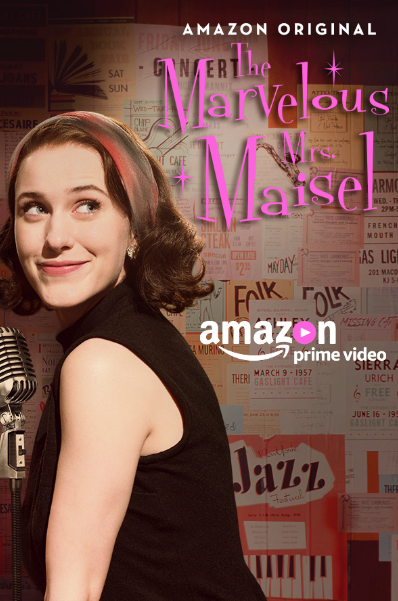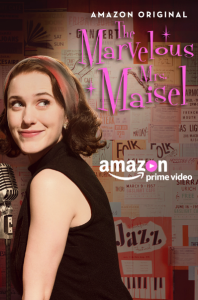
Is Midge Maisel a Bad Mom? A Feminist Query.
 In a recent essay, Rebecca Solnit recalls a Q&A section of a talk she once gave on Virginia Woolf during which the main preoccupation of her audience was the question of whether or not Woolf should have had children. She describes her frustration, writing that “After all, many people have children; only one made To the Lighthouse and The Waves, and we were discussing Woolf because of the books, not the babies.”
In a recent essay, Rebecca Solnit recalls a Q&A section of a talk she once gave on Virginia Woolf during which the main preoccupation of her audience was the question of whether or not Woolf should have had children. She describes her frustration, writing that “After all, many people have children; only one made To the Lighthouse and The Waves, and we were discussing Woolf because of the books, not the babies.”
I thought of that anecdote recently while reading a blog post criticizing the Golden Globe-winning show The Marvelous Mrs. Maisel for its depiction of the titular character’s approach to motherhood. [SPOILERS AHEAD.] The show follows Miriam “Midge” Maisel as her aspiring stand-up comedian husband unceremoniously leaves her, and as she comes to the realization that she’s actually the one in the relationship with the talent for comedy. The Marvelous Mrs. Maisel is reminiscent of that other mid-century period piece, Mad Men, not just because of the fashion and social mores, but because of a deliberately delayed reveal. Just as we only find out that Don Draper is married with children at the end of the first episode, we spend most of the first episode of The Marvelous Mrs. Maisel watching Midge and her husband cavorting downtown and returning to their Upper West Side classic six late at night; we only find out that they have children two-thirds of the way through. This is a harbinger of things to come because it turns out that Midge’s parents, who live in the same apartment building, frequently watch the children, often overnight. This enables Midge to, as blogger Jordana Horn points out, “have very, very little to do with her children.” That the children are mostly out of sight bothers Horn because “Midge’s happiness and sense of self seem to derive almost entirely from her escape from the expected roles of a 1950s housewife and mother.”
Because I am a nerd medievalist, Horn’s perplexity that a show about a woman who is a mother does not focus on her motherhood reminds me of modern reception of what many consider to be the first autobiography in the English language, The Book of Margery Kempe.
5 comments on “Is Midge Maisel a Bad Mom? A Feminist Query.”
Comments are closed.




Wow–you have really illustrated this situation, as it was for me & for many of the mothers in the 1960s on up. I loved my kids but I also loved leaving them every morning for the calm and somewhat stimulating world of work that I got paid for, tho most of every paycheck went to nursery school or babysitter. As for the creative work of writing, if it happened it was in 20 minute bursts between one job and another. That is, we working mothers, many of us married to guys who expected dinner on the table as if we were their mothers, not only spent 8 hrs + commute time at paid work, but we came home to the unpaid job of cooking, cleaning, nursing, planning, counseling, grocery shopping, laundry, bathing the kids & preparing them for sleep, and that was week nights. I often asked myself the same questions as our TV heroine. These days the girls we raised can choose to have kids or not; they can have a creatively fulfilling life, which is possible when girls get a good education, don’t marry young, and are raised to believe in their own worth as more than conveyors of grandchildren.
I agree with the points in this article. I also wish to state that it is noteworthy to finally have another (of too few) series which focuses on American Jews in modern America. Yes, yes, this show has been criticized a lot for perpetrating stereotypes, which it does (especially in the role of Midge’s mother — oy); however, better to stop hiding Jews on screen, especially Jewish women, than to worry that every role is something we want to see. I hope this series will continue, as I found it riveting for many reasons, and fresh. People love to criticize the very things our culture needs the most. Perhaps if we can encourage this show to continue, there might be more shows depicting Jewish life in America — and the more that there are, the better chance of the overall portrayal of Jews to be as nuanced and widely varied as we really are.
Also, I thought it important that the show discloses the influence, the shadow of the holocaust. Even now, we live in that scary shadow — but this takes place less than 10 years after it ended.
This is a fantastic article and the fact that you wrote it – quite literally – while caring for a 4 week old (and an older child) is incredible. I assume you’re too busy to read the comments, but if you do, mazel tov for this insightful essay.
celiackiddo already
No need to over analyze this – you can point to periods in the show where she and Joel will have gone at week or more without seeing their kids. It’s not empowerment, it’s shitty parenting.